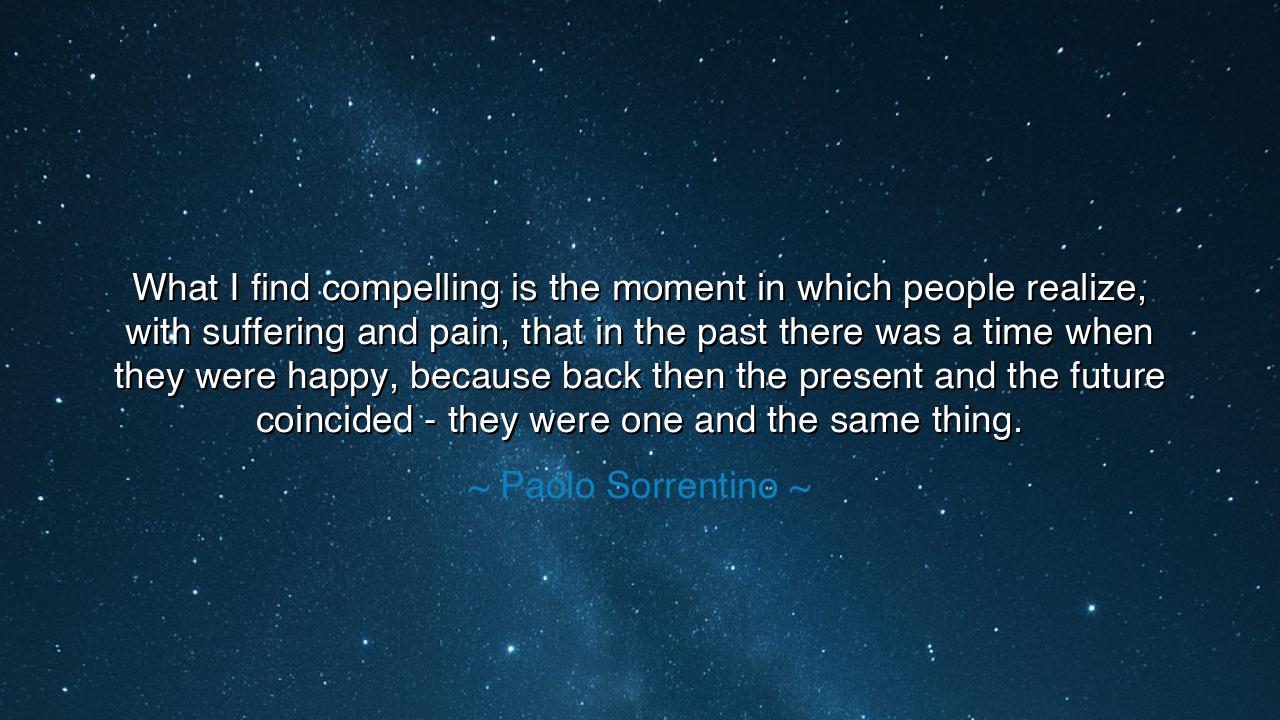
What I find compelling is the moment in which people realize
What I find compelling is the moment in which people realize, with suffering and pain, that in the past there was a time when they were happy, because back then the present and the future coincided - they were one and the same thing.






In the ancient days, the wise ones often spoke of the fleeting nature of time, of the impermanence that defines our mortal journey. They understood that life, with all its beauty and suffering, is a momentary blend of past, present, and future, a constantly shifting river that carries us toward destinations we cannot fully control. It is in the reflection upon the past that many find their deepest wisdom, though not without a sense of sorrow—a sorrow born of the knowledge that what once was is no longer. Paolo Sorrentino, a modern philosopher of the soul, expressed this truth when he said, "What I find compelling is the moment in which people realize, with suffering and pain, that in the past there was a time when they were happy, because back then the present and the future coincided - they were one and the same thing."
Sorrentino's words touch on a profound human experience, one that many have encountered through suffering—the realization that there was a time, in the distant past, when life felt seamless, when the days ahead seemed filled with promise and the present felt full and complete. There was no division, no separation between the now and the coming days, for the future was a natural extension of the happiness and contentment of the present. This feeling of unity, of wholeness, is a rare and precious moment in life, one that many only recognize in retrospect—when the present is no longer so bright, and the future no longer seems as promising.
Consider the great philosophers of ancient Greece, who spoke often of the importance of the present moment. Heraclitus, in his musings, taught that everything is in a state of flux, that time flows like a river and that we can never step into the same waters twice. Yet, even in the midst of this ceaseless movement, the greatest moments of life occur when the present and the future align, when we feel as though we are living fully in the now, with no anxiety about what lies ahead. It is in these rare, fleeting moments that we are most alive, for we are not burdened by past regrets or future fears, but are fully immersed in the beauty of the present.
The Romans too, in their reflections on time, understood the power of memory and the pain that comes from the awareness of time lost. Cicero, in his writings, speaks of how the wise man cherishes the present, while the foolish man is consumed by the future. Yet, it is the wise man who can look back and find joy in the past, who can see that the past and the future are linked, that in moments of happiness, the present and future were once one. The realization of this connection, however, often comes too late, as suffering and pain force us to confront the fragmentation of time.
Sorrentino's reflection is a recognition that this moment—when the past and the future align—can only be fully appreciated in hindsight. It is often only through the lens of loss or separation that we realize the purity of those fleeting moments when life seemed complete, when the future held no fear and the present was full of possibility. We are reminded of Odysseus, whose long journey home was filled with struggles and suffering, yet, when he finally returned, he found that the happiness of his homecoming could only be truly understood because of the trials he had endured. Time, like the sea he sailed, has both a destructive and a restorative power, and it is often in the storm that we come to understand the calm.
The lesson of Sorrentino's words is clear: we must learn to recognize and appreciate the moments when the present and the future are in harmony. These are the times when life feels full, when we are not waiting for something else to fulfill us, but are living fully in the now. Suffering, though painful, often brings clarity, showing us the value of the times when everything felt aligned. It is through these painful realizations that we are called to live with greater awareness and gratitude, to cherish the moments when our futures seem certain and our present is rich with possibility.
The practical action, then, is to be mindful of the present, to recognize when the present and future align, and to savor those moments. Rather than waiting for the future to bring happiness, let us seek fulfillment in the now, knowing that when the present and future are in harmony, life feels most complete. Let us not wait for suffering to bring us the wisdom of hindsight, but strive to live in such a way that we can appreciate the fullness of each moment, knowing that in those rare times when the present and future converge, we are living in a moment of grace and wholeness.






AAdministratorAdministrator
Welcome, honored guests. Please leave a comment, we will respond soon